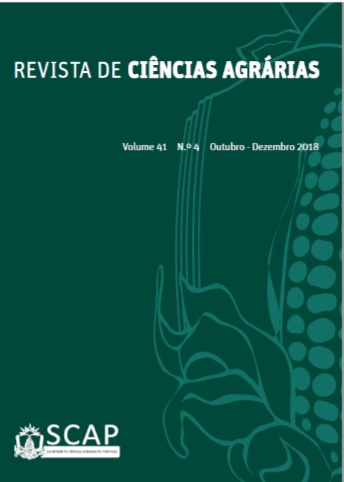Nitrato de potássio ameniza o estresse salino em plântulas de trigo
DOI:
https://doi.org/10.19084/RCA16135Resumo
Sementes de trigo (Triticum aestivum L., cv. Jadeíde 11) foram utilizados para investigar os efeitos do condicionamento osmótico com nitrato de potássio na germinação e no crescimento inicial das plântulas sob estresse salino. Supõe-se que o condicionamento com nitrato de potássio pode melhorar a germinação das sementes e o estabelecimento das plantas por amenizar os efeitos negativos do estresse salino através do seu papel no equilíbrio osmótico das células. As sementes foram embebidas em água destilada ou em solução contendo 10 g L–1 de KNO3 à 25 °C durante 2 horas e, após secagem, foram distribuídas em caixas plásticas com papel mata-borrão contendo diferentes soluções salinas preparadas com concentrações de 0 (controle), 25, 50, 75 e 100 mmol L–1 de NaCl. As caixas plásticas com as sementes foram mantidas em germinador, à 22 °C durante 12 dias. Foi utilizado o delineamento experimental inteiramente casualizado, em esquema fatorial 2 x 5, com quatro repetições de 50 sementes. Sementes de trigo condicionadas com nitrato de potássio possuem maior taxa de germinação, crescimento inicial e índice de vigor de plântulas quando submetidas em condições de estresse salino. Níveis baixos de salinidade podem induzir o ajustamento osmótico nas plântulas de trigo e resultar em maior comprimento da parte aérea e das raízes, enquanto que altos níveis de salinidade causam severa inibição do crescimento das plantas. O cultivar de trigo "Jadeíde 11" é um genótipo moderadamente tolerante ao estresse salino durante a fase de estabelecimento das plântulas, apresentando índice de estabilidade de rendimento superior a 0,74 até o nível de 100 mmol L-1 de NaCl e, portanto, pode ser recomendado para o cultivo em áreas com altos níveis de salinidade do solo.


